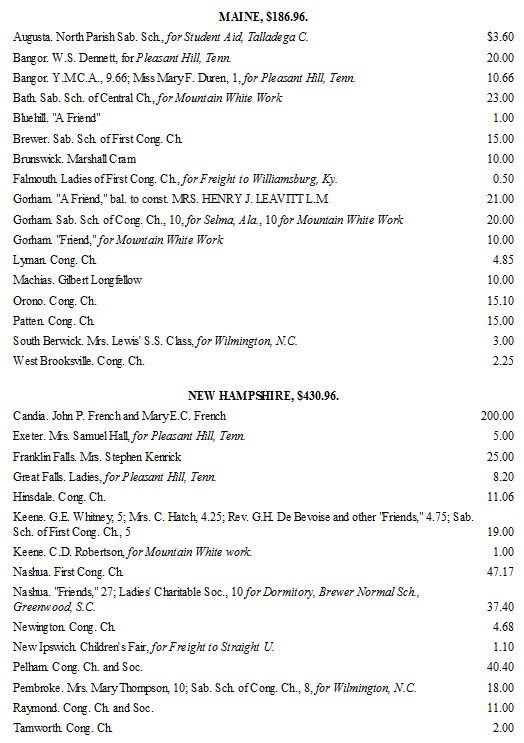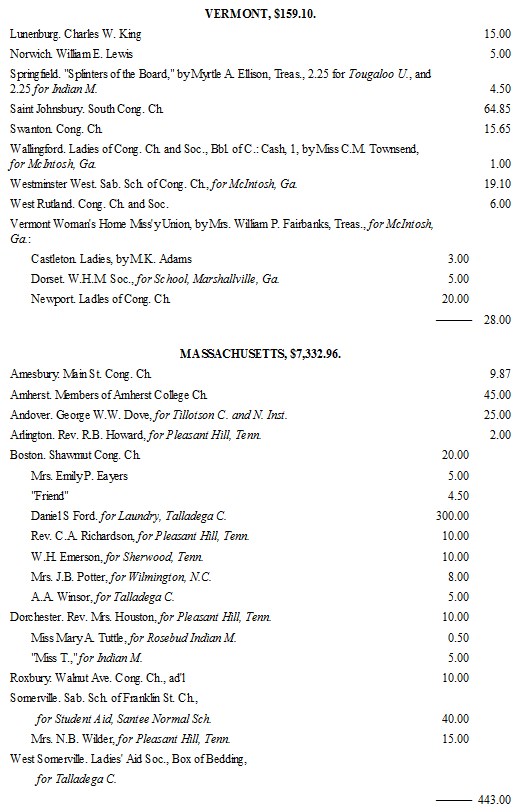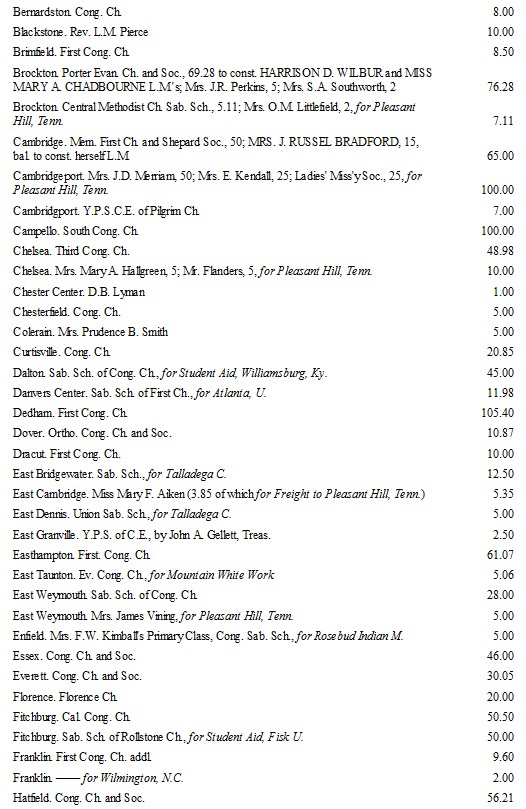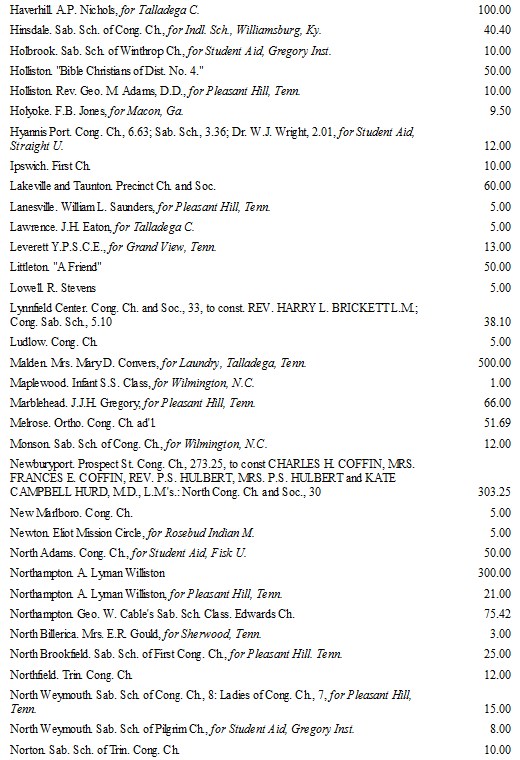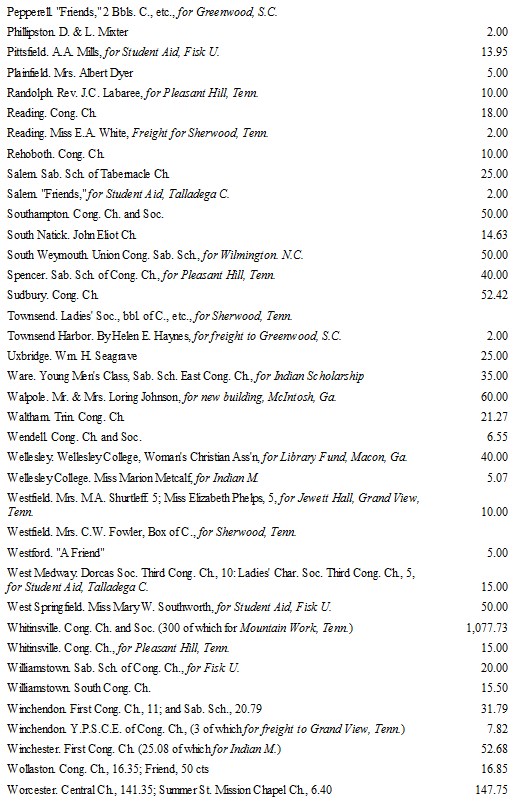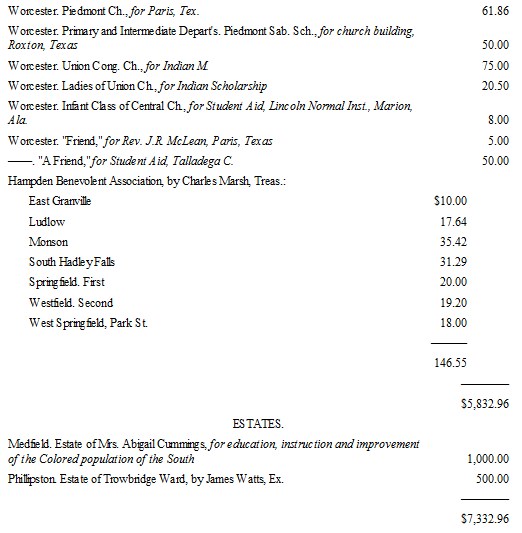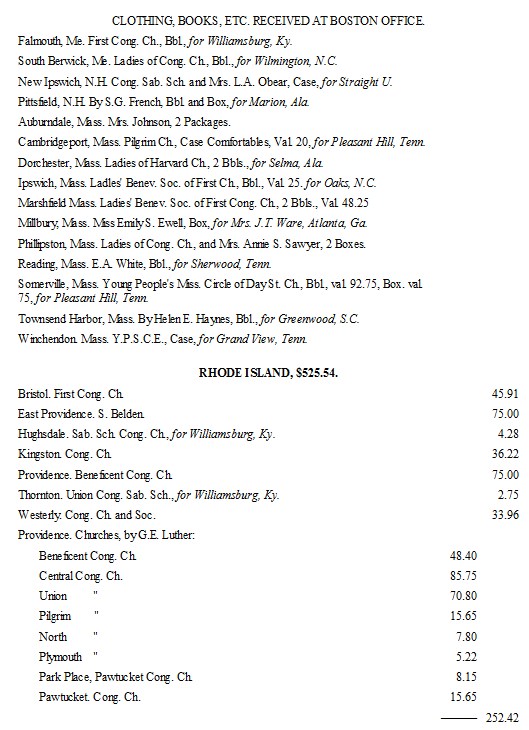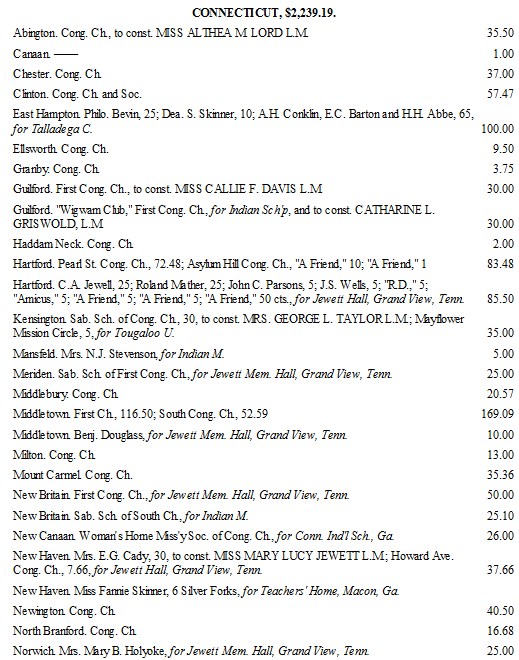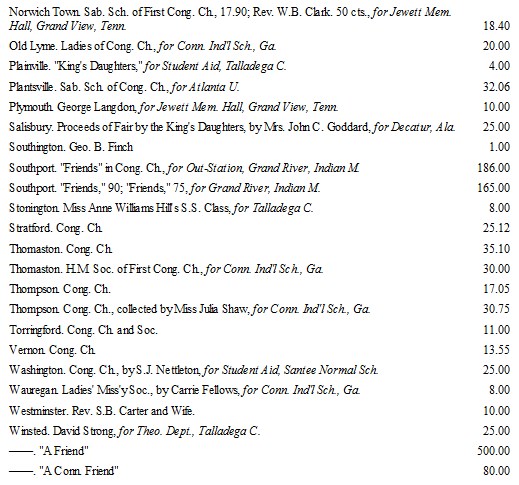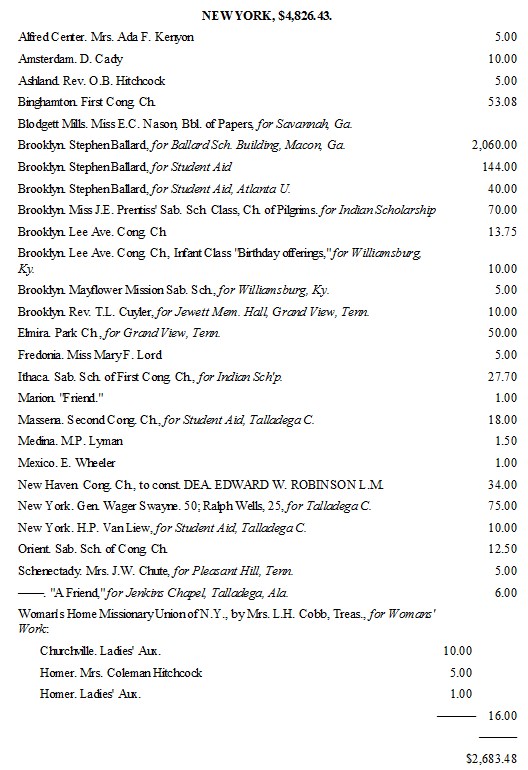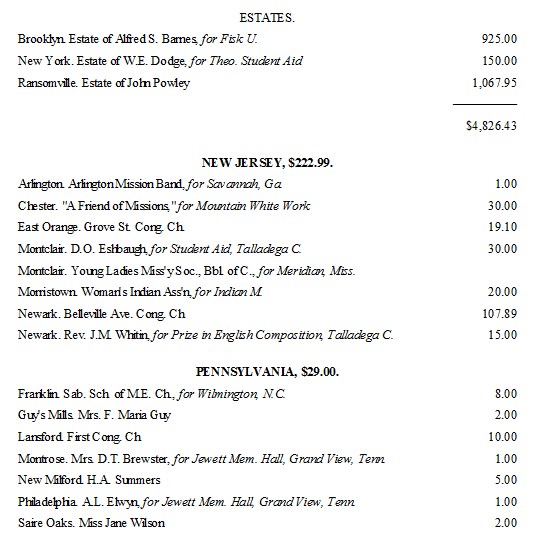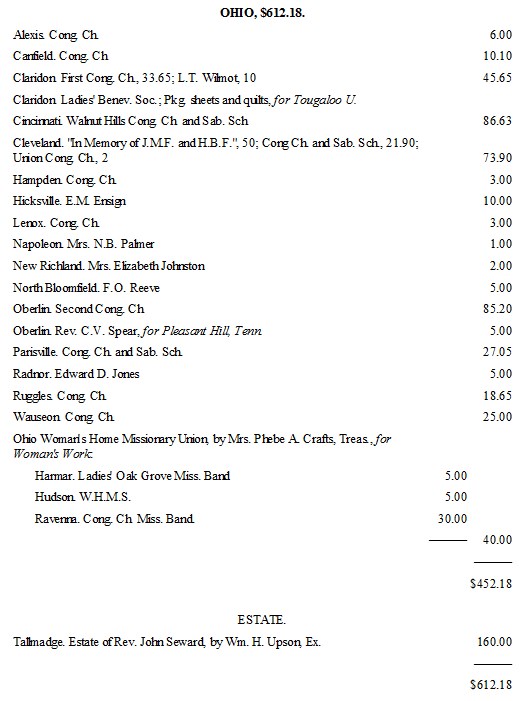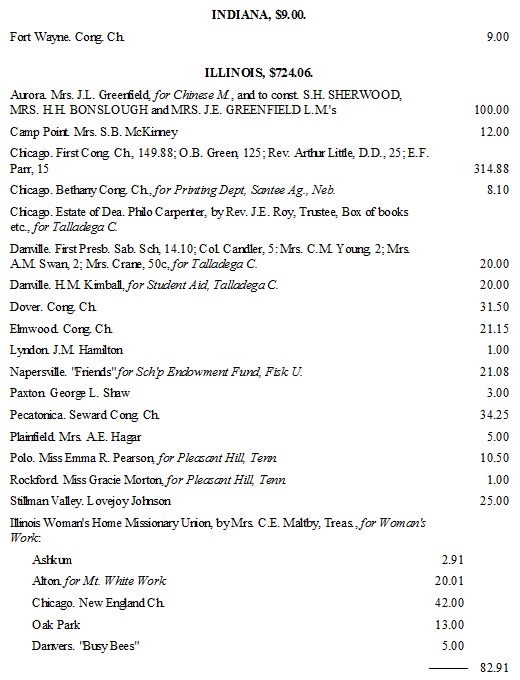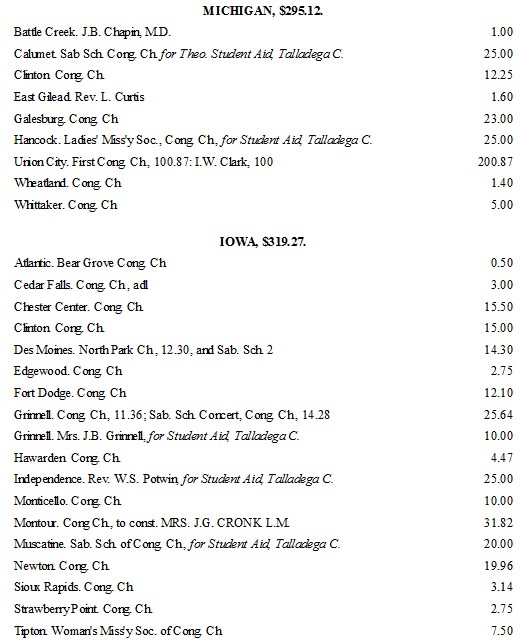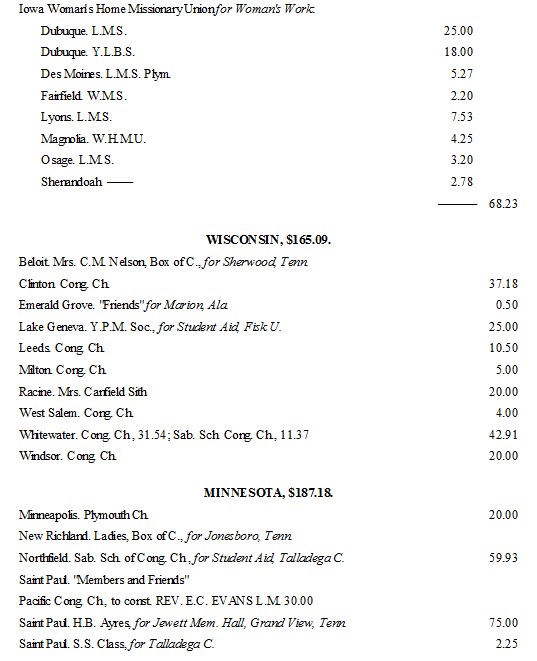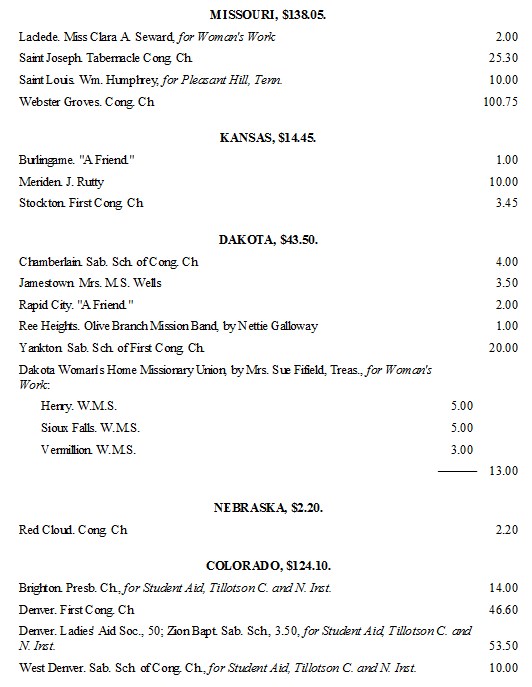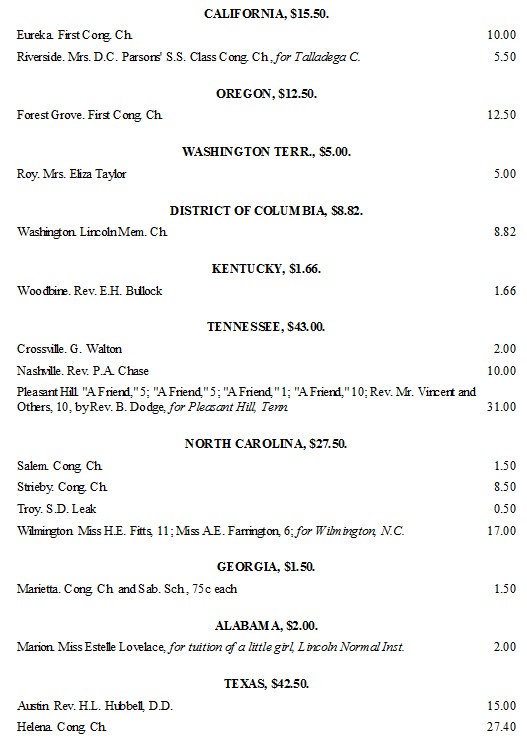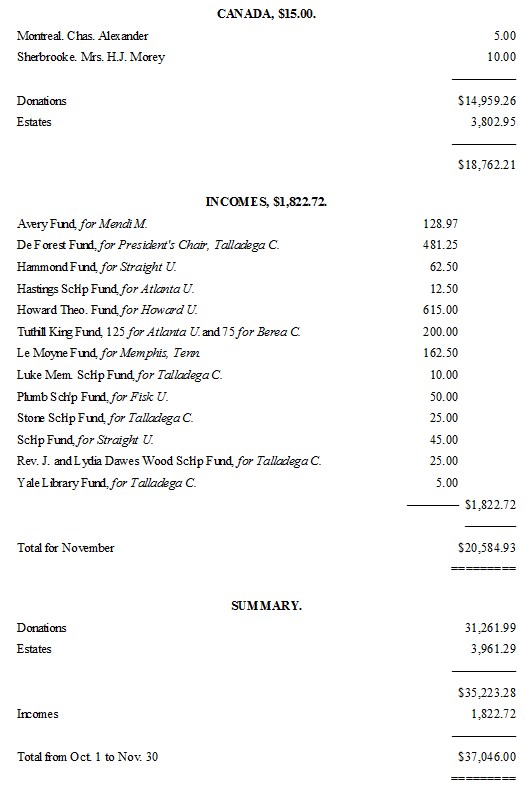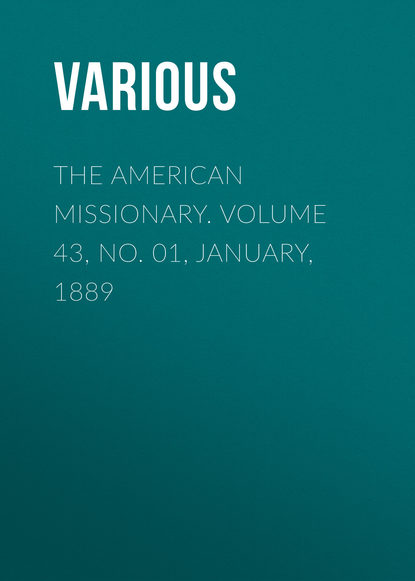 Полная версия
Полная версияПолная версия:
The American Missionary. Volume 43, No. 01, January, 1889
At the close of the war, they went back to their secluded homes, and between them and the world the curtain fell again. We very well know that mortals cannot rise above their surroundings only within defined limits. Alas! for the defeated manhood and blasted womanhood in our land, held down to earth by unfortunate surroundings. They are looking to you for help. You have done nobly in sustaining a work in their midst. Besides what you have done at Pleasant Hill, Grand View and other points, you have enabled us to organize eight churches and build one academy and eight houses of worship. You have sent among us most efficient teachers. Besides their school duties they have taken upon themselves to visit the homes, to pray with the sick, to distribute clothing among the needy, to go to the homes of the students, to share their humble fare and sleep in their crowded rooms. They have spared neither time nor strength to carry the uplifting word to those needy souls. From the better classes we have been fortunate enough to draw a nucleus for each of our churches. We have some Sunday-school superintendents that for zeal and tact are models in their work and many a Northern school might rejoice in the possession of such officers. They are not so well versed in Scripture as we could wish, but they spare neither time nor expense to prepare themselves for their work.
This class of people responds quickly to the new life that comes to them by the school, the railroad or the business man. If we could find as ready response in the masses as we find in the individuals, our work in the mountains would be quickly done. But, alas! what of these hundreds of thousands who seemingly have no more aspiration than the brute in their field? They are wedded to the customs of their ancestors, and they rebel at any innovation. Give them tobacco, and whiskey, and pistols, a little meal and bacon and coffee, a crude bed and a roof, and that, to them, is living. Oh, those purposeless lives! They exist simply because they are in the world and cannot help it. With the girls especially, marriage is the chief aim, and what should be the holy relation is entered upon almost in childhood. As soon as they begin to lisp they are talking of their lovers. A little wee girl came to a teacher's home, and after answering in monosyllables the common questions as to schools and Sunday-schools, there was a lull in the conversation, when she spoke up: "I hain't got no sweetheart." For all marriage is the chief aim, it is surprising how little preparation they make for it. No bridal trousseau is ever thought of; not even a new dress is made for the occasion. I have seen many a bride in calf-skin shoes, old calico dress, long apron, with no cuffs nor collar, and her hair falling from her comb, while the groom appeared with uncombed hair, stogy shoes, jean pants and in shirt sleeves.
We have no rollicking girls or boisterous boys; we never see a crowing, cooing baby. The children are born old. The babies have a sad and dejected look, as if this world were a "dreary wilderness of woe," and they grieve they were ever born. Poor little ones in the Southland! how many are gathered home ere a twelve months' stay on earth. Besides this weary, aged look of the children, we frequently find those who look like walking corpses. A little inquiry reveals the fact that they are clay eaters. We have them in our schools. In our Jellico school, we have children whose elder sisters had to sprinkle pepper around the hearthstones to keep them from digging out the clay and eating it. The habit once formed, it seems to last them during life; where it ever originated I don't know, but have no doubt it was from lack of proper nourishment.
Our women! how shall I describe them? I wish I might picture them before you as they ride into town with their babies in their arms and a child or two on their horses with them, or as they walk in with heavy, dragging gait, loaded with some produce for sale, or as they stand for hours open-eyed and open-mouthed around the counters of some country store. I wish you could see them in their cabin homes, as bare of comfort as a wild desert waste, or at work in the field with the family, but always and everywhere with a chew of tobacco or a snuff stick in their mouths. They never express a desire for what they have not, nor a murmur at what they have, but their very movements are a complaint—a wail. On their face is ever seen that weary, resigned, passionless look. They never lighten with joy or surprise. If you could manage to fire a Vesuvius before their eyes you would never know by any outward expression but that they had seen volcanoes every day of their lives. There is no imagery, no ideality. The world to them is a humdrum routine, a common-place affair. They have no heroes, and they look upon all men, not as protectors, but seducers, not as beings formed in the image of a pure and holy God, but in the image of a God of lust and debauchery.
When first going among these people, the ludicrous or comical keeps presenting itself, but as you stay year by year the terrible reality of their lives presses sore upon you. You are cramped by their narrowness; you are depressed by their lack of buoyancy; you grow distrustful because of their perfidy; you become sharer of their woes, but they have no joys to share.
Our work among them was begun none too soon. The eye of the speculator is being turned to our mineral and timber resources, and with unscrupulous money-makers for a centre and a demoralized people to gather round them, and no Christ in their midst, what strongholds of Satan would be formed. When we commenced our work seven years ago the field was open to the Congregationalists. If we could have had means to have secured helpers we could have planted ourselves largely, for we had continuous calls to come and organize churches. The people of better minds are sick and tired of the church life around them; they cannot indorse it and so are called infidels. But we have found no infidels there; still it takes no prophet to see that the reaction from this demoralized church life all through the mountains is going to create a great wave of infidelity unless real Christians come to the rescue very soon.
How these things nerve us to increased efforts to save the children and youth from these ways of death. Our hope for the land is in saving them, and our work is largely for them. We have many Sunday-schools connected with our churches and many others where we furnish some helps and where our students teach. Our Bands of Hope are encouraging. Our Christian Endeavor Society has a large membership, and is a power for good. But while we rejoice over these places that have these helps we think of the hundreds of counties along this mountain range that have no such helps. Senator Plumb has stated that the assessment in Alabama for pistols, guns and dirks is four times that on farming implements, and Kentucky's record of crime is far worse than Alabama's. Who of us can say that he is innocent of this shed blood, unless he is doing something toward sending the only cure—a Christian civilization? Because the work has many discouragements, are we excused? Because the people are prejudiced against us and our principles, shall we withdraw, and let them sink lower and lower?
But the question is asked: "Have you no public schools or churches in this large section of the country?" Yes, schools for a few months in the year, taught in little log school houses, some with floors and some with none; some with a tiny window and some without; some have doors and some haven't. Very few have desks; in most there are but slab benches. But worse than the school house and its surroundings is the illiterate, immoral teacher who attempts to teach the children. As for church organizations they are numerous, and a large majority are church members; but alas for the Christianity taught and practiced. Religion and morality are divorced. With most of them, religion is the thing of a moment and not of a life. Meetings once a month during the summer, and that is all the Christian institution the people have, and we call it instruction. We are inclined to smile at the thought of a preacher prefacing his sermon with the boast that he has no learning; that his "jeens" coat has never brushed the chalk off college walls, and what he has to say is "no fixup" of his own, but direct from "sac-rid writ" or an "inspiration of the Speret." But our smiles end with a sigh when we see that there is not only ignorance, but "the poison of asps is under their lips." Their hatred for all other churches than their own is intense. They have no charity for any religion outside of their own church. The excitement and strife for membership is unequalled even in the craze of their political wars. They are bigoted and intolerant, they have no idea of practical Christianity. They have no prayer-meeting, no family prayers, no Sunday-schools. One minister living near where we have recently planted some Sunday-schools gave a whole sermon to talking against them, and said if any one would show him from the Bible where Sunday-schools were taught he'd believe they were right; but a few weeks later, pressed by seeing our schools drawing so largely from the community, he thought something must be done, so with a few of his leading members they announced the organization of a school near ours. They sent to Jellico on Saturday and bought two gallons of whiskey in order to draw the crowd. Of course, such a school lasted but a few days, but their hatred doesn't die so easily. We could help many churches if it were not for this jealousy among their ministers. The people are our friends, and our growing churches are a stimulant to them. Paul said: "What matter if Christ were preached through envy, only so he were preached," and if we can provoke them to good works, will not the children be blessed? Whatever cause prompts them to church building, to prayer or outward Christian living, they must be bettered by it.
And so, slowly, but steadily, this great mass is going to be leavened. It may not come in your day or mine, but come it will, and happy will we be in that far-off time to know that we had something to do in bringing about such needed results. We are confident of success. Right must win "since God is God," and the day is coming when the great "I Am" will dwell in all these churches. Then the bigot will say, "my brother;" the intolerant will grasp hands in loyal fellowship, and Christian hearts will pulsate in one common rhythm. Then will our mountains and hills break forth into singing, and all the trees of the field shall clap their hands.
NEEDS OF THE COLORED WOMEN AND GIRLS
BY MRS. G.W. MOOREI have been asked to speak to you on the needs of four millions of women and girls. The time allotted for this paper is far too limited for me to give more than a glimpse of their real condition.
In considering the needs of the colored women and girls of the South, you must bear in mind their past condition, present status and future prospects, together with the forces that have contributed to each, before you can know and feel the heart yearnings and struggles of my sisters.
No human lips can tell the story of that dark night that has left its impress upon the habits, customs and life of a whole race of people. The crudest results of that iniquitous system fell heaviest upon the colored woman. From childhood, no matter how favorably situated, she was liable to become the doomed victim of the grossest outrages. There was no assurance that she would not be a constant associate in the field with the coarsest and most ignorant men of both races, or at any moment, at the caprice of the master, be sold. Swayed, body, mind and spirit, by a master class who found it necessary to close every avenue of intelligence in order to accomplish his fiendish purposes, this creature, made in the image of God, was often taught that there was no God of justice for her. Her body, instead of being a fit temple for the indwelling of the Holy Spirit, was subject to the foulest demands of sensuality. No wonder they sang,
"Nobody knows the trouble I see, Lord,Nobody knows but Jesus."These slave songs, born of agony, might well be called "The Passion Flowers" of the slave cabin. Thank God that all of my sisters were not thus brutalized, and even to those who were, God was merciful. Deep down underneath the lacerated and bruised heart, rested the "Shekinah of the Lord," preventing the wholesale transmission of vice. Two hundred and fifty years of such tuition gave her but little chance to develop her womanhood.
Intuitively she knew that there was a living God, and she sought Him in visions, and listened for His voice, and looked forward and persevered for that home not made with hands, and from her heart were wrung these words:
"O Lord, O my Lord, O my good Lord,Keep me from sinking down."And then comforted, she cried out triumphantly—
"Didn't my Lord deliver Daniel,Then why not every man?"Many have told me their struggles, and I know of others who even suffered death rather than submit to the outrage of chastity. One poor mother with three beautiful baby girls, driven to despair by realizing their probable doom if allowed to live, sent them back to the God who gave them and then took her own life.
Thus the colored women and girls lived before the war.
How have they fared since Freedom?
Have they had a fair chance in the race of life? No. They have met caste-prejudice, the ghost of slavery, at every step of their journey during these years of freedom. They have been made to feel that they are a separate species of the human family. The phrases "Your people" and "Your place," do not so much designate their race identity, as the fixed status in the sisterhood of races. This idea, as harmless as it may appear, or as much as it is used, with varied phrases of meaning, according to the attitude of the speaker, has been one of the greatest barriers to the progress of the Negro, especially of the women and girls. It has colored everything they have to do. Their place, like the ebony of their skin, is a dark place. In the home, and in social life, "their place" is confined to colored society, colored schools and colored churches. Be it understood, I am not reflecting upon colored society, but am pointing out the limitations that no other race in this country has to contend with, in its efforts to rise.
The higher the plane of culture the colored women and girls reach, the more sensitive they become, and the more keenly the effects of ostracism are felt. In wages it does not matter how capable she may be, she must not aspire. I have asked several persons, "What is the greatest need of the colored woman and girl?" and many have replied, "To be good servants." Assuming that this is her highest need, can good servants be had without good wages?
In education, her place is the colored school, if there is one far or near, and if there is no school for colored youth, (as is sometimes the case) the no-school is her place. In religious life, her place is the colored church. No matter how her soul may long for a more intelligent Gospel than perchance surrounds her, she must find it there.
Her place in the work of reform, if she has fallen or desires to reform, is the public street. I could relate many incidents which have come under my personal observation in Washington, (and Washington is far ahead of many places in the South) to illustrate how our fallen sisters have suffered worse than death, because doors have been shut against them. Several cases have been brought to me this year, one since writing this paper, but my sisters, the sad fact is like the advent of our blessed Lord, there is no room in the inn for her.
What is the true place of our women and girls? It is that place which is not circumscribed by the mere accident of birth and race, where she can rise just as high as she has the ability to reach and sustain. My five years' experience in Europe as a Jubilee Singer gave me a taste of the sweets of true womanhood, unfettered by caste-prejudice and by a low estimate of my position. There my complexion was not a target for insult and ostracism. Our needs are not only those common to other races, but are in a vast measure greater, because of the past and present difficulties. The masses furnish the most difficult problem to solve. How can we rescue them from poverty and illiteracy, and not pauperize them? How can we prevent crime, check immorality and decrease mortality? The answer lies in giving to them better home life, more elevating social surroundings, better educational advantages in school and industries, and a higher type of Christian life and worship.
My first introduction into an intelligent idea of practical Christianity was at Fisk University. There, and at many similar institutions under the A.M.A., may be found the epitome of a Christian home. Such schools furnish potent object lessons; such are the factors of the problem in answer to the question of how to meet the needs of the colored women and girls, who are to preside over the homes of eight millions of people, who had no home twenty-three years ago. Washington, alone, has a population of eighty thousand colored people, and more than forty thousand of these are women and girls.
It is said that the "hand that rocks the cradle, rules the world." It matters not whether that hand be black or white, but it does matter whether that hand be intelligent or ignorant. They not only need the education of the schools to develop their minds, and industrial training to prepare their hands for the practical duties of life, but Christian education, such as is given in the schools of the Association.
More than three thousand women and thousands of men have gone out under the A.M.A., in school, home and church, for the uplifting, Christianizing and elevating of our people.
Eternity alone will reveal the work that these Christian heroines and heroes have done in the Master's name. The eleventh chapter of Hebrews would need be extended to give to them their rightful place in the role of achievements of faith. We need not wait for eternity, we now see some of the grand results; their memory is already engraven upon the hearts, and their spirit infused into the life of thousands of educated colored young men and women, who have gone out among their people, carrying educated minds, trained hands and warm hearts, as an outgrowth of that labor which has not been in vain. This magnificent record of Christian endeavor and conquest has largely been made possible by the foresight, energy and fidelity of the many who have been and are at the head of the different departments of the A.M.A.
How can the Association more fully meet these needs? By continuing woman's work for woman, through their Woman's Bureau. Through this agency, ladies of the churches can furnish volunteers for the work and the base of supply. While we at the front are in the heat of the battle, you at home, through your missionary societies, young people's meetings, and Sunday-schools, can aid us with your prayers, your sympathy, your gifts and service. Those in the larger churches can sustain a missionary in the field, and may it be said of all, both large and small, "They have done what they could." Then we can sing,
"March on, and you shall gain the victory,March on, and you shall gain the day."My sisters, we must first be touched by the Spirit of the Master, and through him touch them. This work cannot be done perfunctorily or professionally.
And now in conclusion allow me to thank you in behalf of the millions whom I represent, for the faithful work and practical sympathy already given, and appeal to you in his name, and through you to the thousands whom you represent, for a continuation of your Christian efforts and support, also for greater supplies and larger gifts to the treasury of the A.M.A., that it may be able to furnish the laborers according to the demands of the growing needs of more than four millions of colored women and girls, who are trying to help themselves. Our lamented President Garfield said to the Jubilee Singers during their visit to Mentor: "Ethiopia is not only stretching out her hand unto God, but God is stretching out his hand unto Ethiopia." We believe this, and that the time is coming when all races shall sing:
"O, brethren, rise and shine and give God the glory,For the year of Jubilee."RECEIPTS FOR NOVEMBER, 1888
